Chevrolet Equinox Service Manual: Transmission Replacement Automatic Transmission Unit
Removal ProcedureRemove the battery tray. Refer toBattery Tray Replacement.Remove the transmission range select lever cable and bracket. Refer toRange Selector Lever Cable Bracket Replacement.
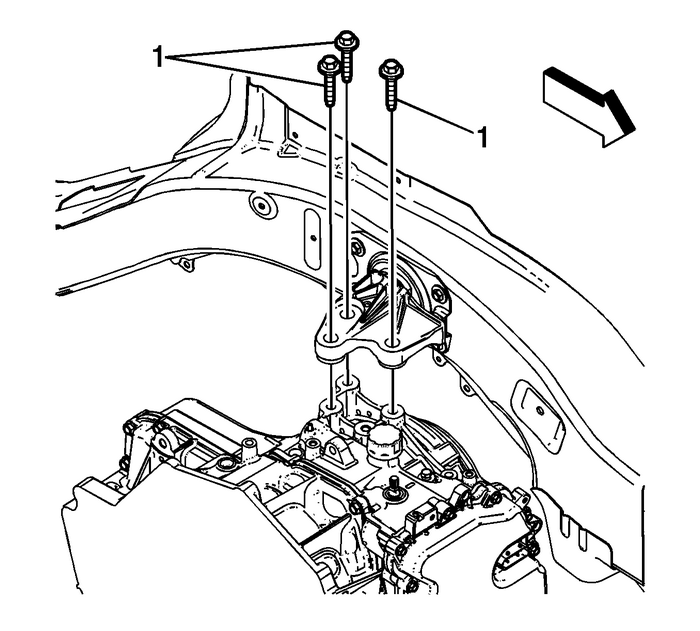
Remove the left transmission mount bolts-(1) from the transmission.Drain the transmission fluid. Refer toTransmission Fluid Drain and Fill.
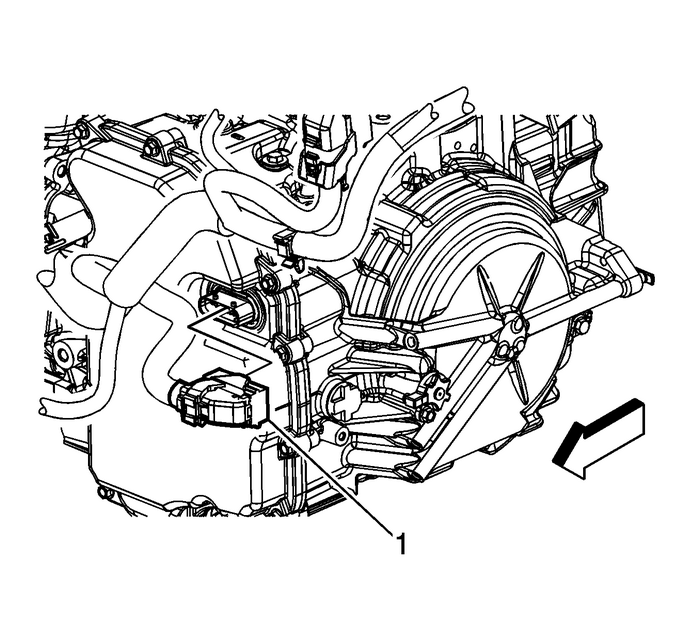
Disconnect the control valve body transmission control module (TCM) electrical connector-(1).
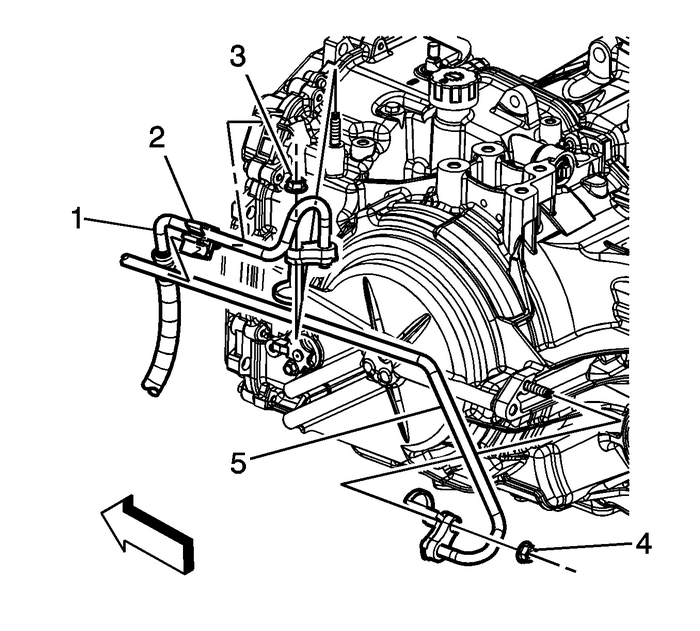
Remove the oil cooler inlet-(1) and outlet-(5) hoses from the retainer-(2) on thecontrol valve body cover.Remove the transmission fluid cooler inlet hose nut-(3) from the transmission.Remove the transmission fluid cooler inlet hose-(1) from the transmission.Remove the transmission fluid cooler outlet hose nut-(4) from the transmission.Remove the transmission fluid cooler outlet hose-(5) from the transmission.Plug and/or cap the hose and transmission to prevent contamination.
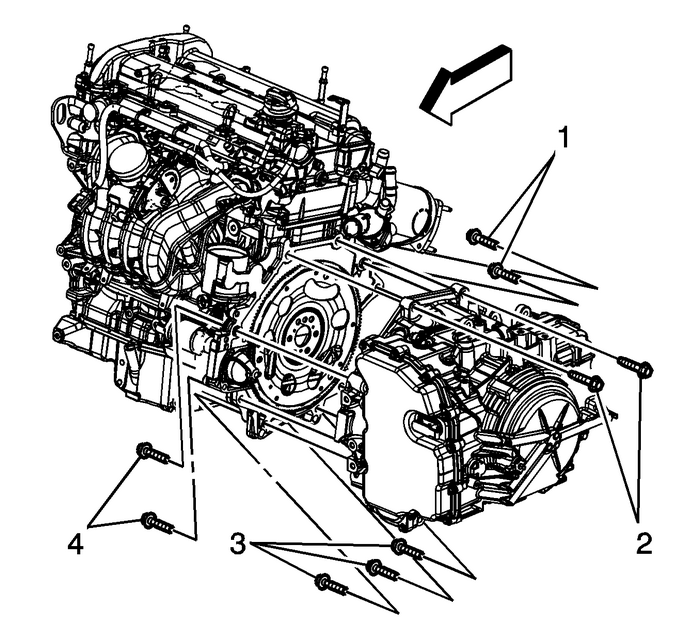
Remove the upper transmission to engine bolts-(2).Remove the frame. Refer toDrivetrain and Front Suspension Frame Replacement.Disconnect the wheel drive shafts and intermediate shaft from the transmission. RefertoFront Wheel Drive Shaft Replacement.On AWD equipped vehicles, remove the transfer case. Refer toTransfer Case Assembly ReplacementRemove the rear transmission mount bracket from the transmission. Refer toTransmission Rear Mount Bracket Replacement.Remove the front transmission mount from the transmission. Refer toTransmission Front Mount Replacement.
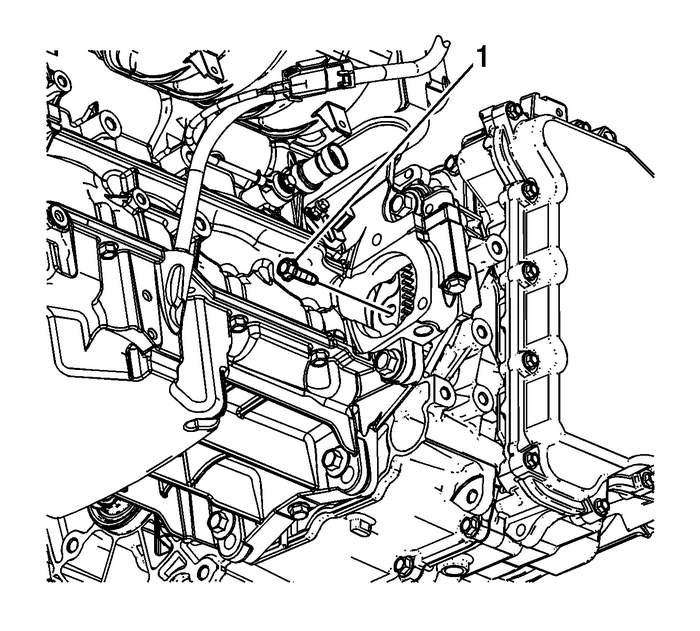
Remove the starter. Refer toStarter Replacement.Mark the relationship of the flywheel to the torque converter for reassembly.Remove the torque converter to flywheel bolts-(1).Use a transmission jack in order to support the transmission.

Remove the remaining transmission bolts-(1,-3,-4).
Note:Insure the torque converter remains securely in place on the transmission input shaftwhile separating and removing the transmission.
Separate the transmission from the engine.Lower the transmission with the transmission jack far enough to remove the transmission.Flush and flow test the transmission oil cooler and lines. Refer toTransmission Fluid Cooler Flushing and Flow Test.Installation ProcedureRaise the transmission with the transmission jack and position the transmission tothe engine.
Caution:Refer toFastener Caution.
Install the transmission bolts-(1,-3,-4) and tighten to 75-Y (56-lb-ft).Remove the transmission jack.
Install the torque converter to flywheel bolts-(1) and tighten to 60-Y (45-lb-ft).Install the starter. Refer toStarter Replacement.Install the front transmission mount to the transmission. Refer toTransmission Front Mount Replacement.On AWD equipped vehicles, install the transfer case. Refer toTransfer Case Assembly Replacement.Install the rear transmission mount bracket to the transmission. Refer toTransmission Rear Mount Bracket Replacement.Install the intermediate drive shaft and wheel drive shafts to the transmission. RefertoFront Wheel Drive Shaft Replacement.Install the frame. Refer toDrivetrain and Front Suspension Frame Replacement.

Install the upper transmission to engine bolts-(2) an tighten to 75-Y (56-lb-ft).

Install the transmission fluid cooler outlet hose-(5) to the transmission.Install the transmission fluid cooler outlet hose retainer nut-(4) and tighten to22-Y (17-lb-ft).Install the transmission fluid cooler inlet hose-(1) to the transmission.Install the transmission fluid cooler inlet hose retainer nut-(3).Install the oil cooler inlet-(1) and outlet-(5) hoses to the retainer-(2) on the controlvalve body cover.

Connect the control valve body TCM electrical connector-(1).Install the transmission range select lever cable and bracket. Refer toRange Selector Lever Cable Bracket Replacement.Install the battery tray. Refer toBattery Tray Replacement.Adjust the automatic transmission range selector lever cable. Refer toRange Selector Lever Cable Adjustment.Fill the transmission with fluid. Refer toTransmission Fluid Drain and Fill.

Install the left transmission mount bolts-(1) to the transmission and tighten to57-Y (42-lb-ft).If a NEW TCM has been installed into the vehicle, the NEW module needs to be reprogrammed.Refer toService Programming System (SPS).
Note:The Transmission Adaptive Values Learn procedure must be performed when one of thefollowing repairs have been made to the vehicle. Failure to perform the procedureafter one of the following repairs may result in poor transmission performance, aswell as transmission DTCs being set:
Transmission internal service/overhaulValve body repair or replacementControl solenoid valve assembly replacementTCM software/calibration updateAny service in response to a shift quality concernPerform the Transmission Adaptive Values Learn procedure. Refer toTransmission Adaptive Values Learn.Road test the vehicle. Transmission Replacement (FWD) Automatic Transmission Unit
Transmission Replacement (FWD) Automatic Transmission Unit
Removal ProcedureRemove the battery tray. Refer toBattery Tray Replacement.Remove the transmission range select lever cable and bracket.Drain the transmission fluid. Refer toTransmission Fluid Drain a ...
 Transmission Mount Replacement - Left Side Automatic Transmission Unit
Transmission Mount Replacement - Left Side Automatic Transmission Unit
Removal ProcedureRemove the battery tray. Refer toBattery Tray Replacement.Remove the underhood electrical center.Support the engine and transmission.Remove the left transmission mount to transmission ...
Other materials:
Front Floor Console Flood Lamp Replacement Consoles Center Console
Front Floor Console Flood Lamp ReplacementCalloutComponent NamePreliminary ProcedureRemove the roof console. Refer toRoof Console Replacement.1Front Floor Console Flood LampProcedureDisconnect electrical connector. ...
